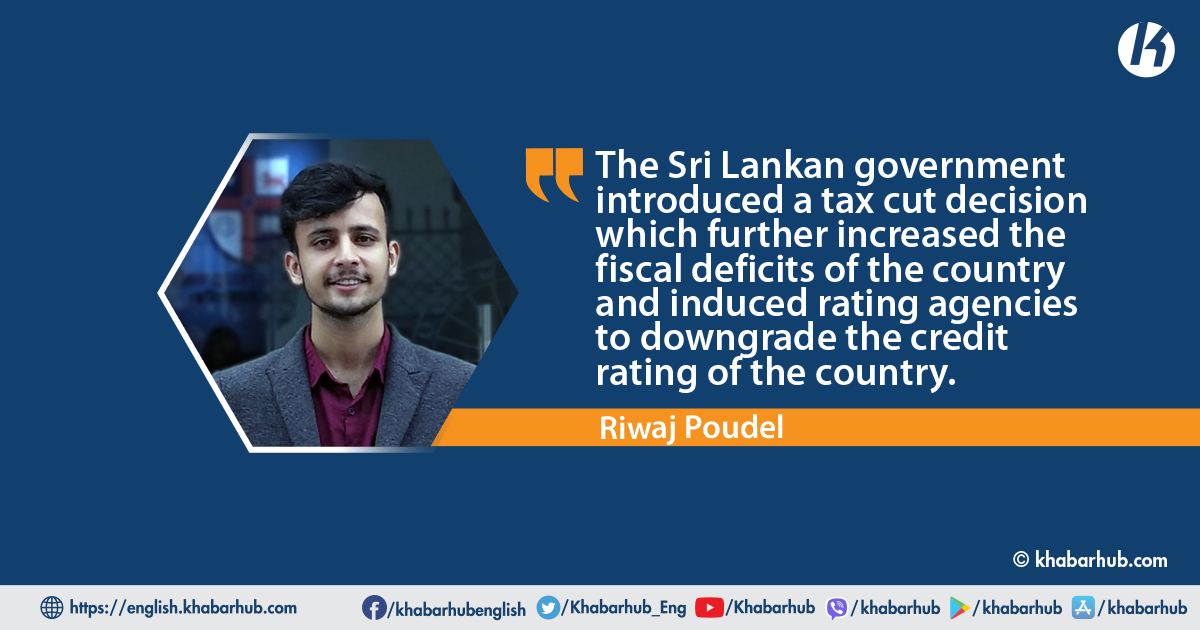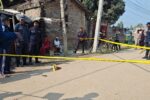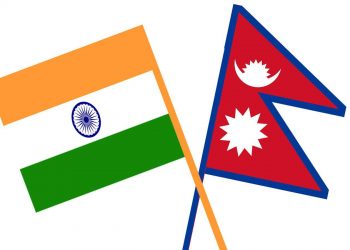Sri Lanka also known as the “pearl of the east” is blemished due to its current economic and political crisis. Prior to the crisis, Sri Lanka has been a strong economy in South Asia with robust economic and social indicators.
In the status quo, the country has no money to buy petrol and other necessary items and is facing a humanitarian crisis.
Hospitals are struggling to get medicines and ambulance does not have enough fuel to run. This has led the country into chaos with political and economic instability.
Background of the crisis
There are a series of incidents that led the country to plunge into the crisis. In May 2019, the easter attack derailed the tourism industry of the country and further covid-19 pandemic exacerbated the recovery of the tourism industry.
The effect in the tourism industry directly affected the foreign reserves of the country as the tourism sector was one of the major sources of earning foreign currency for the country.
Similarly, remittances had also been lowered due to the pandemic which further worsen the reserves of the country.
This was the time for the government to take wise steps to avert the economy from getting into a crisis but in contrast leadership of the country had taken unwise economic decisions.
The government introduced the tax cuts decision which further increased the fiscal deficits of the country and induced rating agencies to downgrade the credit rating of the country.
As per the report, the government had lost income of more than $1.4 billion a year from the decision of the tax cuts.
The imprudent decisions of the government continued as it announced to completely ban the imports of chemical fertilizers without proper plan and coordination.
The decision of the government to shift its agriculture sectors into organic farming proved to be disastrous which led to an overwhelming drop in agricultural production.
The tea industry of the country had been negatively affected by the decision as it was also been the major source of foreign currency.
The severity of such decisions can be measured from the data that Sri Lanka had foreign reserves of $7.6 billion at the end of 2019 which is now dropped to less than $50 million.
What is the way forward?
The first and foremost priority of the country should be focused on maintaining law and order and ensuring the safety of public properties.
As the protestors had ransacked the building of the presidential palace, challenges lie ahead to institutions to maintain law and order inside the country.
Unless and until there is the law and order the recovery of the country from the crisis is less likely. As there is weak leadership in the country, this situation can be exploited by extremists and radicals.
Any decision which is unwise can lead the country to social unrest. The country which had already been into a civil war back in history should undertake cautious steps ahead to prevent the situations like past, especially at the time of crisis.
Sri Lanka should also deal with external threats and ensure the law and order inside the country to avert the terrorism threats like the Easter bombing of 2019.
Sri Lankan institutions responsible should act firmly to deal with the upcoming challenges and facilitate leadership to make peaceful political and economic transitions.
Second, Sri Lanka needs political stability to assure the lenders that they would be able to pay their loans in the future.
For political stability, there should be a national consensus on the issue and political leadership needs a consensus-based policy framework and short-term plan to get out of the crisis.
As Sri Lanka is suffering its worst economic crisis since its independence in 1948, it should expedite to implementation of an immediate solution that could help to ensure law and order along with economic stability.
After the protestors ransacked the presidential palace, former president Gotabaya Rajapaksa fled away the country and sent their resignation from abroad.
After that Prime Minister Ranil Wickremesinghe took over the post of president as interim president. Recently, he has been elected as the new president by the parliament of Sri Lanka and it would be a laborious task for him to manage the upcoming challenges.
At a time when the world is focusing on the Russia-Ukraine war, it would be difficult for the country to get much focus but they do not have other options rather than asking the international arena for help.
Amid the worse situations going inside the country, Sri Lanka needs a bailout package from the IMF, however, there are many terms and conditions required to get the loan approved by IMF.
For that, there is a need for strong political leadership with robust plans, as IMF won’t grant financial support without political stability.
The new government should also undertake economic reforms such as withdrawing tax cuts decision and reducing government spending so that IMF agrees to a more substantial bailout package which is urgently needed for the country to recover its economy.
Such type of crisis needs the state and society to work together. People should be mobilized so to rebuild the economy of the country and with a government that does not have the trust of the people, it would be difficult for the country to initiate and implement the recovery plan.
According to the election commission of Sri Lanka, it would cost Rs 5.7 billion to hold a new election and the country does not have enough funds to finance the election.
So, political stability needs to be restored with the current parliament and the new government should work to rebuild the trust of the people.
Third, the government in Sri Lanka must work to ensure the supply of necessary items such as food, oil, and medicines.
The World Bank had suggested some measures for the country to have a robust economy such as rolling back the manure policy and increasing agricultural productivity, investing in non-agrarian jobs, supporting comprehensive reforms for increasing labor productivity, and promoting and strengthening social inclusion.
For that, they need to engage with international partners and ask for more help from the country to prevent a humanitarian crisis.
At a time when the world is focusing on the Russia-Ukraine war, it would be difficult for the country to get much focus but they do not have other options rather than asking the international arena for help.
Some of the positive steps have been coming forward as they had got a line of credit from the neighboring country India for the imports of necessary items like fuel, food and medicines.
As per the energy minister, the country has also been in talks with Russia for the fuel aid that they can get from one of the largest exporters of oil.
In order to recover its economy, the country needs to have a resilient supply chain so that to ensure enough raw materials needed for industry.
For productivity growth, they should lower tariffs on the imports of raw materials which could help the industry to increase production at a low cost.
Ensuring a supply of necessary items should be given priority to lessen the black market and reduce the exacerbation of the humanitarian crisis.
Fourth, the government should undertake economic reforms in the agriculture sector and tourism sectors.
The country has the lowest foreign reserves, there is no money to buy necessary items, almost all the economic indicators are at their all-time low and inflation is at its peak.
The major reason for the crisis is an unwise economic decision made by the previous government which needs to be changed.
With a robust government, the country needs to rectify the errors made by the previous government in terms of policy level and work on improving its economic cycle.
They can improve the economic cycle by strengthening the supply chain and increasing domestic production for export growth.
This strategy can help the country to get foreign currency to increase its reserves which could be crucial to repaying its debt.
The decision of the previous government to ban chemical fertilizer was disastrous to the agriculture sector resulting in to fall in its agricultural export, new leadership should work to increase agricultural production by ensuring the supply of fertilizer to farmers to boost agriculture production.
So, South Asian countries must keep eye on their foreign reserves and make them sustainable. Most countries are agriculture-based economies the flaws in the agricultural policy can lead the nation to a crisis whenever they are going to announce new policies on sensitive sectors they should have a proper assessment of the pros and cons.
As a long-term strategy government should work to mobilize farmers to increase the production of agricultural goods by providing them relief and support. Government should also work on improving its tourism industry by incorporating strategies to increase the inflow of tourists.
At a time when the economy of the country is in disruption, substantial efforts should be undertaken to revive the sectors, especially which would help the country to earn foreign currency.
Similarly, the government should also restrain from funding the debt fund to unsustainable projects and have a proper assessment when funding them.
The World Bank had suggested some measures for the country to have a robust economy such as rolling back the manure policy and increasing agricultural productivity, investing in non-agrarian jobs, supporting comprehensive reforms for increasing labor productivity, and promoting and strengthening social inclusion.
Such measures are not only enough for the country to deal with the crisis at a time when they need funds to implement plans. So, they urgently need funds to implement the plans and run the economy without further delays.
Lesson for South Asian economies
The main lesson that South Asian economies including Nepal can learn is that economic mismanagement along with peak cronyism can lead the country into a crisis.
There is a lesson for the people of South Asia that they should elect visionary political leaders who have a long-term vision for the country’s future.
Similarly, there is also a lesson that unsustainable funding of the debt is damaging to the economy. There are many things identical to the economies of Sri Lanka and South Asia as most of the economies are import-based economies and whenever the global commodities price soar prices of import increases.
So, South Asian countries must keep eye on their foreign reserves and make them sustainable. Most countries are agriculture-based economies the flaws in the agricultural policy can lead the nation to a crisis whenever they are going to announce new policies on sensitive sectors they should have a proper assessment of the pros and cons.









Comment